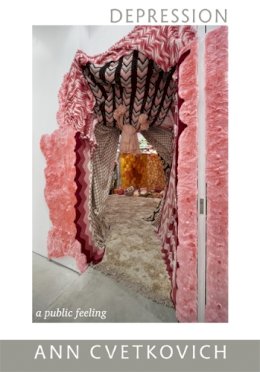
Depression: A Public Feeling
Ann Cvetkovich
Cvetkovich draws on an unusual archive, including accounts of early Christian acedia and spiritual despair, texts connecting the histories of slavery and colonialism with their violent present-day legacies, and utopian spaces created from lesbian feminist practices of crafting. She herself seeks to craft a queer cultural analysis that accounts for depression as a historical category, a felt experience, and a point of entry into discussions about theory, contemporary culture, and everyday life. Depression: A Public Feeling suggests that utopian visions can reside in daily habits and practices, such as writing and yoga, and it highlights the centrality of somatic and felt experience to political activism and social transformation.
Product Details
About Ann Cvetkovich
Reviews for Depression: A Public Feeling
Tyler Cowen
New York Times Magazine
“Depression: A Public Feeling… sets out to challenge ‘contemporary medical notions’ of depression ‘that simultaneously relieve one of responsibility (it’s just genes or chemicals) and provide agency (you can fix it by taking a pill)’. . . . In anatomising her ‘lived experience’ of writer’s block, Cvetkovich invites the reader to ask whether, despite the trade-specific terminology, this is still a symptom exclusive to writers. . . . [H]er perceptions are agile.”
Talitha Stevenson
New Statesman
“Depression succeeds at opening up a public discussion on certain kinds of depression that are often dismissed as trivial, like the stress of academic labour. . . . [C]lear and helpful with a vision for overcoming melancholy through a transformation of everyday life.”
William Burton
Lambda Literary Review
“[Cvetkovich] has taken some huge risks with Depression. Rather than building a traditional academic argument with research and theory, the book combines stylistically distinct and potentially disparate parts that add up to a highly readable, relatable, radical treatise that provides many points of entry and fresh thinking on one of the most overexamined subjects of the past few decades.”
Cindy Widner
Austin Chronicle
“At one end, Depression is a call to expand how we frame and engage with depression, and at the other it’s an internal appeal to academia to accept personal experience as a valid source material for scholarship. By melding the personal and the academic, Cvetkovich is creating an important new forum for how we discuss depression. . . . The material is totally fascinating. . . .”
Nina Lary
Bitch
“Cvetkovich offers us an introduction to thinking critically about depression's causes and its manifestations as well as, perhaps, the localised tactics that are necessary to enable recovery. At the end, she turns rather sweetly to crafting as one reparative habit, partly because of the aesthetic of connectivity that it can stimulate. Knitting yourself out of depression: it's kind of folksy, but I liked it.”
Sally Munt
Times Higher Education
“The book’s merit is in jolting us out of our habit of thinking about depression as a personal, medical issue, reminding us of the ways in which the rules and roles of society influence our psyches and feelings about ourselves. By taking depression out of the exclusive domain of the therapeutic culture, [Cvetkovich] challenges us to make new connections between the individual’s experience of depression and life within a depressive culture.”
Irene Javors
Gay & Lesbian Review
“[A]n experiment in connecting personal feelings with social conditions and critical analysis. . . . Cvetkovich finds a variety of ways to utilize the tools of academe to build a shelter from the traumas of academe. It's both funny and oddly endearing to see an academic response to depression that turns it into a field, organizes conferences and protests with special and entertaining dress requirements, recommends cures for writing blocks, and appropriates American anxiety in the interest of getting academic work published.”
Elaine Showalter
Chronicle Review
“Although she is not the first to consider that institutionalized racism causes depression, Cvetkovich’s take on academia’s ills is unique. . . . Still, Depression is not a pity party. Cvetkovich offers hope to all who fight depression by suggesting that as she has emerged from despair, so can others.”
Rachel Pepper
Curve
“Cvetkovich draws us into her own encounters with various obstacles and leaves us with the sense that all the insights she has gained have been unexpected gifts—earned through lots of hard work, but still contingent, provisional, uncertain. If you have ever been a struggling academic, you will relate, and you will feel grateful.”
Aaron Sachs
American Quarterly
"It is important that Cvetkovich is able to balance the personal desire for feeling better alongside a questioning of the investment that exists in both medical and critical social models of depression. Importantly, while this approach never undermines the experience of depression by positioning it only as a construction, it still draws attention to commonplace assumptions about feeling sad, being political and getting better. Cvetkovich weaves her own journal through the critical reading that makes her work so compelling—simultaneously taking seriously, and asking us to question, the more familiar narrative she has just shared."
Jacqueline Gibbs
Feminist Review
